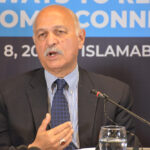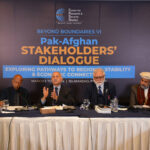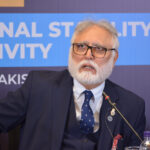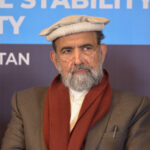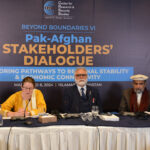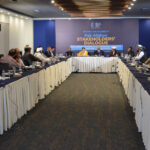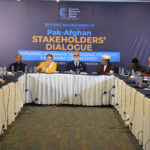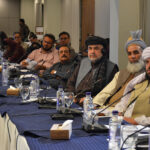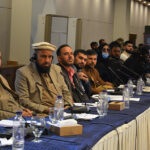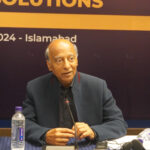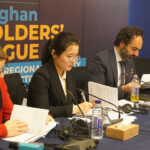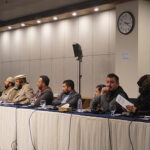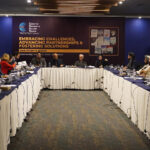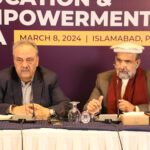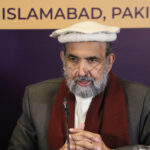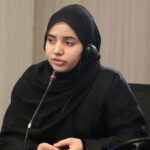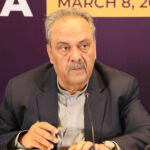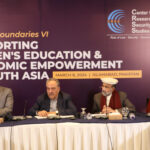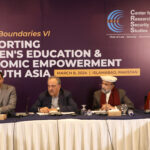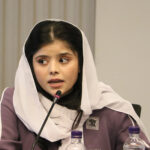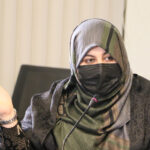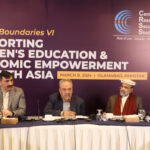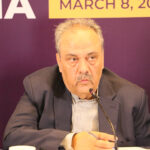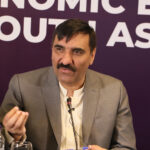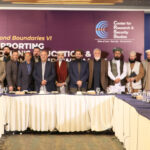Introduction
The Pak-Afghan Stakeholders Dialogue convened a wide array of voices from Pakistan and Afghanistan to deliberate and suggest solutions to critical bilateral issues. These encompassed trade and economic connectivity, regional peace and stability, the plight of Afghan refugees and migrants, border affairs, and concerns regarding education and the welfare of Afghan girls and women. The forum was inclusive, incorporating perspectives from trade and commerce experts, tribal elders, as well as male and female religious scholars and academicians. The Pakistani delegation comprised 2 female and 12 male participants, while the Afghan delegation included 2 female and 10 male participants, reflecting a diverse geographic representation from both sides. Senator Mushahid Hussain Syed convened a unique session with dialogue participants to evaluate “Regional Perspectives on Geo-Economics” on the opening day of the event. Additionally on March 8, 2024, Ambassador Asif Durrani, Pakistan’s Special Envoy to Afghanistan, along with Mr. Jehanzeb Khan, the Project Director of HEC, interacted with female Afghan participants on matters concerning education and employment opportunities for Afghan girls in Pakistan.
Background
The strained relationship between Pakistan and Afghanistan revolves around Pakistan’s persistent concerns regarding the Tehreek-i-Taliban Pakistan (TTP) allegedly operating from Afghan territory. Despite repeated engagements and warnings from Pakistani officials, the response from the Islamic Emirate of Afghanistan has been unsatisfactory. This has allowed the TTP’s activities, including cross-border attacks, to escalate since the Taliban’s resurgence to power, resulting in significant casualties among Pakistani security forces.
The escalation of terrorist attacks in 2023 led to a marked increase in security forces casualties, reaching the highest level in eight years, amplifying Islamabad’s frustration. Following the breakdown of a ceasefire between the government and the TTP in November 2022, the TTP’s attacks intensified. The ceasefire, though short-lived, represented an unsuccessful attempt by Pakistani authorities to quell the armed group’s longstanding conflict against Pakistan.
Efforts to negotiate with the Taliban to rein in the TTP have yielded no visible results, with the Taliban requesting time and financial aid to address the issue. In response, Islamabad has adopted a more assertive approach, refusing to engage in talks with the TTP and implementing measures to pressure the Taliban, including deporting undocumented Afghans and imposing trade restrictions.
Despite recent discussions between Pakistani and Afghan officials, little progress has been made on the TTP issue, with the Afghan side requesting additional time for action. However, the utilization of coercive measures and the propagation of hostile narratives from both sides risk further damaging relations. This ongoing animosity impedes regional stability and economic connectivity, underscoring the urgent need for enhanced communication and cooperation between the two nations.
Critical Analysis
The dialogue focused on key themes of trade and economic connectivity, regional peace and stability, refugee and border affairs, and human rights, particularly women’s right to work and girls’ right to education. The issues remain the same on both sides: Afghanistan is undergoing a humanitarian and human rights crisis coupled with economic challenges, whereas Pakistan’s main concern remains the militancy in the region, particularly terror attacks carried out by TTP.
This time, the forum saw a wider representation, including senior government officials, a senior political representative, FCDO representatives, eminent religious scholars, academics, civil society members, and experts in trade and economy. As a result, the discourse was not just an echo chamber but a blend of differing viewpoints, albeit with common goals.
The participation of officials from the FCDO also proved insightful for the implementing partners as well as the participants. The officials emphasized the UK’s commitment towards Afghanistan and highlighted ongoing aid support, urging practical solutions through dialogue and emphasizing the interconnectedness of girls’ education, inclusivity, and economic connectivity for stability in the region. They reiterated the UK’s commitment to Afghan-led dialogue, dispelling myths about its stance on engaging with the Taliban. The UK wants to engage with the Taliban and its preconditions for recognizing the Taliban include the establishment of an inclusive government, protection of women’s rights, and cooperation on counterterrorism measures – all of which are global demands.
Notably, there was increased interest and participation from Pakistani government officials. However, even among Pakistani officials, there seemd divergent approaches to engaging with Afghanistan. For instance, Senator Mushahid Hussain Syed stressed the necessity of a “regional reset” in Pakistan’s policies, particularly concerning Afghanistan. He advocated for a strategic realignment that prioritizes constructive engagement and economic integration with neighbouring countries, such as Afghanistan and China. He also addressed the issue of Afghan migrants in Pakistan, advocating for a more inclusive approach. He argued that individuals born in Pakistan should be recognized as citizens, drawing comparisons with other migrant communities like the Rohingyas and Biharis residing in Pakistan.
In contrast, Special Envoy to Afghanistan, Asif Durrani’s comments reflected Pakistan’s current Afghan policy seemingly grounded more in realpolitik than historical precedents. Durrani asserted that Pakistan’s stance against undocumented migrants “aligns with international law”. He stressed the importance of “mutual respect for sovereignty” and argued that opposition to recent measures regarding passport and visa documentation for border crossings goes against principles of sovereignty.
Any meaningful dialogue or negotiation between the two countries must consider and prioritize economic connectivity, regional peace and stability, and the welfare of the people on both sides. Failure to address these interconnected issues risks perpetuating bilateral tensions and hindering progress towards lasting peace and prosperity in the region.
The three-day dialogue underscored the interconnection between economic connectivity, regional peace and stability, and the welfare of the people on both sides. Progress in one area is contingent upon advancements in the others.
Firstly, economic connectivity and trade emerged as foundational pillars of the bilateral relationship. Both sides recognised the imperative of robust economic ties for sustainable growth and prosperity. However, achieving meaningful economic integration is hindered by various challenges, including border delays, smuggling, and trade restrictions. Consequently, prioritizing economic cooperation becomes essential to unlock the full potential of the relationship.
Secondly, regional peace and stability are indispensable for fostering an environment conducive to economic growth and social development. Both Pakistan and Afghanistan face security threats from militant groups like the TTP and Daesh, which destabilize the region and impede progress. Addressing these security challenges requires concerted efforts, including intelligence sharing, joint counterterrorism operations, and diplomatic engagement on state-to-state and people-to-people levels. By prioritizing regional peace, both countries can create the necessary conditions for economic cooperation to flourish.
Finally, the welfare of the people on both sides emerged as a central concern of the dialogue. Issues such as visa delays, educational opportunities for Afghan students in Pakistan, and the impact of border closures on trade and livelihoods underscored the human dimension of the bilateral relationship. Recognizing the interconnectedness of economic, security, and humanitarian concerns, the governments ought to prioritise the well-being of their citizens in all policies and negotiations.
Recommendations
The following recommendations resulted from the discussions that took place throughout the dialogue under different agenda themes.
Bilateral Relations, International Cooperation, and Regional Peace and Stability
Task Force on Afghanistan: Establish a task force comprised of like-minded individuals to pursue goals related to Afghanistan’s stability, economic development, and regional connectivity.
Establishment of Intelligence Sharing Commission: A dedicated intelligence sharing commission should be established to facilitate security cooperation among relevant stakeholders. This commission would serve as a platform for sharing vital information and coordinating efforts to address security challenges effectively.
Facilitate Cooperation and Trust Building: Encourage cooperation and trust-building between Pakistan and Afghanistan through government-to-government delegations and bilateral dialogues.
Engagement with Taliban: Shift from ideological alignment to interest-based engagement with the Taliban, using diplomatic channels and Islamic knowledge to convince them.
International Cooperation: Work with international organizations and partners, such as the EU and UN, to address issues related to Afghanistan’s stability and economic development.
Community-Led Initiatives: Support community-led initiatives for counter-terrorism efforts and regional stability, complementing government efforts.
Dialogue and Diplomacy: Emphasize the importance of dialogue, diplomacy, and engagement with dissenting voices, including the Taliban and their oppositions, to find practical solutions and break stalemates. Hold track II dialogues in Kabul and Kandahar to amplify messaging.
Condemn Terrorism Openly: Both Pakistan and Afghanistan should unequivocally condemn terrorism prioritize diplomatic language and refrain from supporting hateful narratives.
Interim Taliban Recognition: Advocate for international recognition of the Taliban on an interim basis until they call for elections, to facilitate their integration into the international community.
Renew Institutional Mechanisms: Renew and implement institutional mechanisms such as APAPPS (Afghanistan-Pakistan Action Plan for Peace and Solidarity) and APTTA (Afghanistan-Pakistan Transit Trade Agreement) to address economic, political, and refugee-related issues.
Disseminate Positive Messages: Disseminate positive messages through academia, writing, and media to counter negativity and promote peace-building efforts.
International Engagement and Dialogue: Engage with international partners, such as the UK and China, to seek support for peace initiatives and regional stability. Dialogue should focus on inclusive approaches and engagement with all relevant parties, including the Taliban, to find sustainable solutions to conflicts.
Trade and Economic Connectivity
Enhance Regional Trade Ties: Prioritize efforts to enhance trade and economic connectivity between Afghanistan, Pakistan, and Central Asian countries, including addressing border issues, infrastructure development, and advocating for Taliban’s representation in international forums like CAREC, WTO, etc.
Encourage Regional Collaboration and Investment: Collaborate with regional powers and invest in infrastructure and economic projects to promote long-term stability and prosperity.
Combat Smuggling: Conduct a proper investigation into smuggling routes and establish a definite policy to tackle smuggling, including identifying smuggling spots, sources, and routes.
Enhance Facilitation for Business Visas: Streamline visa procedures by clearly stating required documents, reducing documentation requirements, and improving standards at border crossings like Torkham. The visa regime should be made more accessible to applicants, reducing the need for intermediaries and minimizing the potential for bribery.
Refugee/Migrant and Border Affairs
Friendly Visa Policies: Introduce friendly visa policies for Afghan refugees in neighbouring countries, including Pakistan, to address humanitarian concerns and support regional stability.
Address Border Issues: Resolve border issues, such as visa policies and border crossings, to facilitate people’s movement and trade between Afghanistan and Pakistan.
Humanitarian Concerns and Women’s Rights: Address humanitarian concerns, including the rights of women and refugees, as integral parts of peacebuilding efforts. Initiatives should prioritize education and healthcare access for all, regardless of gender or nationality.
Girls’ Education
Advocate for Girls’ Education: Prioritize the reopening of girls’ schools in Afghanistan, and exert pressure through religious clerics and the international community to ensure the normalization of girls’ education.
Engage Religious Scholars in Advocacy on Girls’ Education: Engage religious scholars from Pakistan to visit Kabul and have open yet mindful discussions with Taliban representatives on women’s issues, meet female teachers, and educational heads to discuss their issues and chalk out solutions.
Increase Scholarships and Provide Mechanisms to Continue Education: Increase the number of Allama Iqbal scholarships for Afghan students, particularly focusing on providing scholarships as per the semesters to female students who were left behind.
Day 1 – Meeting of the Core Committee
CRSS convened a meeting of the core committee before the commencement of the main dialogue. This core committee is a newly introduced informal body led by CRSS with the most active and relevant participants of the Beyond Boundaries VI initiative. The committee members so far include Dr. Qibla Ayaz- Chairperson Council of Islamic Ideology, Mualana Hamid ul Haq- Vice Chancellor Dar-ul-Uloom Haqania, Maulana Tayyab Qureshi- Chief Khateeb KP ,Mufti M.Qasim- Mohtamam Jamah Islamia, Chaman, Mufti Qasim Haqqani-Mohtamam of Jamia Arabia Qasim Uloom Al-Islamiya, Chaman , and Dr. Sajida Jameel, – Head of Islamic Studies Department- International Islamic University Islamabad .
Purpose
The core committee is meant to serve as a mechanism within Beyond Boundaries, comprising a select group of participants representing religious, tribal, and trade interests, to engage in focused discussions and strategic planning. The Core Committee convenes before broader dialogues to delve into the core issues and chart a course for enhanced effectiveness and impact of our cross-border dialogues.
Objectives
This mechanism will aim for the following key objectives:
- Detailed Discussions: The Core Committee provides a forum for addressing issues that may require deeper analysis and may not be feasible within the broader dialogue group.
- Improvement Strategies: Brainstorming on and deliberating strategies to enhance the overall quality and efficacy of the Beyond Boundaries initiative. This includes evaluating past dialogues and identifying areas for improvement.
- Sharp Focus: Deliberating on methods to sharpen the focus of broader dialogues, ensuring that discussions remain relevant, purposeful, and aligned with the overarching goals of fostering peace and cooperation between Pakistan and Afghanistan.
- Identifying Gaps: Identify any gaps or deficiencies in the ongoing dialogues, allowing for proactive adjustments and refinements to the dialogue process.
- Insights from Kabul and Kandahar: Leveraging participants’ connections and partnerships in Afghanistan, seek feedback from key stakeholders in Kabul and Kandahar to enrich discussions and align perspectives. This helps ensure that the dialogue remains responsive to the needs and aspirations of Afghan stakeholders.
- Guidance for Improvement: Drawing on their collective expertise and experience, committee members provide guidance and recommendations on how to further enhance the process and ensure that Beyond Boundaries delivers tangible, results-oriented outcomes for peace and stability in the region.
Proceedings of the Meeting
Sameena Durrani, reflecting on the forum’s progress and challenges in advancing bilateral relations between Pakistan and Afghanistan, emphasized the necessity of stakeholder support. She noted the scarcity of female religious scholars in advocacy roles, underscoring the importance of platforms like Beyond Boundaries for identifying such leaders. She applauded Dr Sajida Jameel’s initiative to educate Afghan girls online, in collaboration with an Afghan friend, highlighting grassroots efforts to bridge educational gaps.
Qasim Haqqani emphasized the religious fraternity’s commitment to advocating for bilateral issues and recounted positive interactions with Taliban officials during his visit to Kandahar, where assurances of support for private diplomatic channels were received. Mufti M. Qasim emphasised the interlinked economic and sociopolitical stability of Pakistan and Afghanistan, endorsing CRSS as an effective forum for long-term mutual benefit and cooperation.
Dr Qibla Ayaz emphasized the crucial role of Britain in promoting stability in the Pak-Afghan region. He stressed the need for translating academic discourse into actionable steps and urged governmental involvement in addressing issues, especially those of divided tribes and visa hindrances.
Maulana Hamid ul Haq Haqqani highlighted recurring visa complaints and stressed the importance of religio-political people-to-people exchanges in strengthening bilateral ties. He noted Afghan concerns regarding treatment at border crossings and underscored the need for humane treatment and cooperation.
Maulana Tayyab Qureshi discussed sensitivities in Afghan-Pakistani relations, noting bureaucratic hurdles, and advocated for direct, open dialogue with key stakeholders. He praised CRSS for its inclusive approach and recommended visa/residential leniency for Afghan investors and business setups in Pakistan.
Dr Sajida Jameel expressed gratitude to CRSS for fostering awareness of Afghan issues and proposed expanding the forum online to accommodate Afghan female scholars and activists who are unable to attend such dialogues physically due to travel restrictions. She advocated for educating border tribes, integrating women’s issues into madrassah curricula, and using the opportunity of sermons at mosques for messaging.
Overall, the discussions emphasised the importance of grassroots initiatives, friendly policies, diplomatic engagement, and inclusive dialogue for fostering mutual understanding and cooperation.
Day 2 – Thematic Focus: Economic Connectivity and Stability
Keynote by Senator Mushahid Hussain
In his keynote address, Senator Mushahid Hussain shared his perspectives on Pakistan’s Afghan policy and regional dynamics.
Reflecting on his extensive experience and expertise in the region, he underscored the importance of stability in Afghanistan and called for a reassessment of Pakistan’s Afghan policy. He urged a more inclusive approach towards Afghan migrants, advocating for their integration into Pakistani society. He argued passionately that those born in Pakistan should be granted Pakistani citizenship, drawing parallels with other migrant communities residing in Pakistan like Rohingyas and Biharis.
Highlighting the importance of regional cooperation, Senator Hussain called for separating border trade from political tensions and terrorism. He praised China’s consistent policy stance and encouraged constructive engagement with the Taliban, stressing cooperation over dictation.
Delinking trade from politics is crucial for promoting connectivity with Afghanistan
Discussing the changing trade dynamics between Iran and Afghanistan, Senator Hussain welcomed the return of peace to Afghanistan after years of conflict, and noted the international community’s acceptance of the Taliban as a de facto authority, given that several countries have their envoys present in Afghanistan.
Senator Hussain pointed out the international community’s acknowledgement of the Taliban as the de facto rulers of Afghanistan, highlighting Russia’s desire to engage with them despite facing obstacles.
On regional infrastructure projects like CPEC, Senator Hussain advocated for open borders and proposed Afghanistan’s inclusion in such initiatives. He suggested leveraging corridors like the Wakhan Corridor for peace and prosperity and exploring energy projects like the Iran-Pakistan pipeline. Additionally, he emphasized China’s interest in preventing Central Asian Republics from being landlocked and connecting them via Gwadar port.
“Pakistan’s internal security is inextricably intertwined with geopolitics,” he said while underscoring the interplay between Pakistan’s relations with its neighbours and its internal stability. He said that regional peace, security, and stability are also inextricably intertwined with the same in Afghanistan as preconditions. He called for a reassessment of historical perceptions regarding Afghan groups and strategic clarity in Pakistan’s Afghan policy, advocating for a more cooperative and inclusive approach.
The senator underscored the gradual nature of governmental mindset shifts, citing examples like the US-China relationship and historical events such as the Islamic and Cuban revolutions. He highlighted a transition in Pakistan from ideological alignment to interest-based dealings with the Taliban, including within military circles. Additionally, he emphasized China’s interest in preventing Central Asian Republics from being landlocked and connecting them via Gwadar port.
He proposed the establishment of a task force comprising like-minded individuals to address Afghanistan-related issues, stressing the influence of public opinion and changing realities.
Mushahid referenced the recent Gaza conflict, where US policymakers adapted their language due to electoral considerations – a shift in mindsets and priorities led to more frequent use of the word “ceasefire”.
In response to a participant’s concern about protests in Chaman and border issues, Mushahid committed to convey the conference’s key messages and the delegation’s concerns in the Senate session that he was to attend later.
Remarks by Sam Sherman, Head of Regional Stability, British High Commission
Sam Sherman from BHC emphasized the United Kingdom’s ongoing support for the Afghan people, highlighting Afghanistan as a significant recipient of UK aid. He reiterated the UK’s backing for an inclusive government in Afghanistan and stressed the necessity of Afghan-led dialogue to address the current lack of inclusivity. Additionally, Sherman debunked three myths regarding the UK’s stance on engagement with the Taliban, perceptions of the Pashtun belt as a geopolitical battleground, and divisions within the international community regarding recognition.
Preconditions for Taliban recognition include the formation of an inclusive government, protection of women’s rights, and cooperation on counterterrorism measures.
He reiterated the UK’s preconditions for Taliban recognition, i.e. an inclusive government, assurance and safeguarding of women’s rights, and counterterrorism measures. Moreover, Sherman dismissed allegations of hidden agendas in Pakistan, affirming the UK’s sole aim of fostering peace and stability in both Pakistan and Afghanistan. Ultimately, he expressed the UK’s unwavering goodwill towards Pakistan and reiterated its dedication to promoting peace and stability in the region.
Sherman noted that while closing borders might offer short-term effectiveness, it doesn’t prove sustainable in the long run. He noted the efficacy of borderless travel in Europe but acknowledged its unfeasibility in regions like Pakistan and Afghanistan grappling with crises. Sherman concluded his remarks by applauding the efforts of CRSS in promoting regional stability and friendly ties between the two countries.
Summary of Discussions on Day 2
Session 1(a): Trade and Economic Connectivity
Khan Jan Alokozay underscored the need for a more realistic perspective on Afghanistan, suggesting that many observers form opinions without visiting the country. He emphasized the importance of firsthand experience in understanding the complexities of the Afghan situation. Furthermore, he pointed out the strained trade relations between Pakistan and Afghanistan, noting that despite ongoing conflicts, countries like India and China continue to trade. Alokozay proposed relocating the joint chamber of commerce to Islamabad to facilitate more effective trade discussions and resolutions.
On the border closures, Alokozay asserted that the treatment meted out by the Ghani administration and others towards Pakistan should not result in punishment for the current de facto administration.
Ali Raza Hanjra addressed specific challenges encountered at the border, particularly infrastructural and procedural inefficiencies. He highlighted the need for improved transportation infrastructure and streamlined customs procedures to expedite the movement of goods across the border. Additionally, Hanjra advocated for the establishment of a payment settlement mechanism to facilitate smoother trade transactions between Pakistan and Afghanistan. He also proposed establishing closer connections between the relevant members of the Beyond Boundaries initiative and customs authorities to address customs-related challenges more efficiently as direct engagement with customs officials could help resolve issues such as border congestion and smuggling effectively.
The lack of Afghan representation in international economic forums denies Afghanistan crucial opportunities for economic connectivity and growth.
Hanjra added that the absence of Afghan stakeholders in forums like CAREC (Central Asia Regional Economic Cooperation Program) deprives Afghanistan of key economic connectivity gains. Based on his recent experience at the CAREC meeting in Singapore, he noted that despite being a member country, Afghanistan was not present, presumably due to international sanctions affecting its participation. This absence hinders the resolution of trade and transit-related issues, as Afghanistan’s perspectives and cooperation are vital for effective decision-making within the CAREC framework. If Afghanistan joins forums as such, it can contribute to fostering a conducive environment for regional economic cooperation and benefit from the advantages that CAREC offers in terms of streamlined documentation and enhanced connectivity among member countries.’
Hanjra voiced another issue, noting the lax enforcement of scanning procedures on the Afghan side. Afghan authorities have conveyed that scanning is not their main priority, and they are open to Pakistan customs conducting the scanning if necessary.
Several participants, including Naqibullah Safi, Daroo Khan Achakzai, and Malik Mashal Khan, raised concerns about border management issues, bribery, and socio-economic development in the region. They emphasized the need for enhanced cooperation and transparency to address these challenges effectively. Naqibullah Safi specifically highlighted the difficulties faced by Afghan traders due to restrictions on banking transactions, calling for a resolution to this issue.
Abdul Waheed Waheed emphasized the importance of empathy and cooperation at both ends of the border, stressing that mutual understanding and collaboration are essential for overcoming trade barriers and promoting stronger bilateral relations.
Ibrahim Shams highlighted the significance of certain energy products from Afghanistan for Pakistan’s economy, suggesting that closer cooperation in this sector could benefit both countries economically.
Arbab Qaiser outlined steps taken by Pakistan customs to address traffic congestion and streamline border procedures, including the implementation of new scanning protocols and extended operating hours for customs clearance. He also discussed efforts to revise the list of banned items to facilitate smoother trade flows between the two countries. He pointed out that the closure of Chaman for several months and a 10-day border closure in January exacerbated the problem, particularly affecting the transportation of perishable goods such as seasonal fruits.
To address these challenges, Qaiser outlined several measures. Firstly, he mentioned that vehicle scanning would now take place before reaching Torkham, with scanning operations continuing during nighttime. He emphasized the importance of scanning empty containers for the transportation of goods and assured efforts to expedite their clearance. Additionally, he mentioned urging Afghan authorities to extend customs clearance hours beyond 8 PM to help reduce delays.
Qaiser also addressed concerns on the Pakistani side regarding smuggling activities across the Afghan border, underscoring the need for vigilance and cooperation to address these issues effectively.
Yaqoob Shaikh discussed the recent increase in Afghanistan’s exports to India through the Wagah border crossing and proposed re-examining the list of banned items to improve trade relations between the two countries. He also emphasized the potential for enhanced transit trade between Pakistan, Afghanistan, and Central Asia, particularly following revisions to the ban items list.
Remarks by Zoe Ware, Political Counsellor, British High CommissionTop of Form
Zoe Ware expressed her gratitude to the CRSS team and forum participants for tirelessly working to enhance bilateral ties. She conveyed her deep affection for the people of Afghanistan, highlighting the beauty she sees in the country and the place they hold in her heart.
Acknowledging tensions stemming from Pakistan’s policies on Afghanistan and threats like the TTP originating from Afghanistan, Ware emphasized that these issues have strained state-to-state relations but not the relationship between people. She mentioned the UK’s aid contribution to Afghanistan and expressed belief in engaging with the current Taliban regime, despite their absence from crucial forums, such as the recently held Doha conference. Emphasizing inclusive government, she pointed out the diverse voices represented within the UK government.
Ware stressed the importance of dialogue in resolving issues and encouraged reaching out to Kabul. She mentioned the upcoming UN visit to Afghanistan and hoped for positive outcomes and cooperation. Additionally, Ware voiced support for girls’ education, noting the encouragement from clerics and religious communities on the issue.
Our aim is for Afghanistan to achieve a stable future where all groups and individuals are treated equally and can live peaceful lives.
Expressing concern over terrorism threats like ISKP in the region, the diplomat emphasized the need for practical solutions and collective efforts to ensure stability and a peaceful future for Afghanistan. She underscored the interconnectedness of girls’ education, inclusivity, and economic connectivity in achieving this goal.
Ware encouraged participants to consider addressing specific messages to the incoming Pakistani government regarding their approach to dealing with Afghanistan. She expressed interest in how participants would work with the new government and whether the new government understands issues as does the forum.
Part of diplomacy is to speak to people who disagree with you, it’s a combination of allies and opponents.
Regarding the stalemate in recognition talks, Ware highlighted the ongoing efforts to move beyond this impasse. She noted the backing of the international community for the UN and its special envoy in this process. Ware emphasized the importance of diplomacy in engaging with both allies and opponents, urging the exploration of new ideas to break the stalemate and find effective ways to engage dissenting voices.
Session 1(b): Regional Stability, Taliban Governance, and Socioeconomic Conditions
Maulana Tayyab Qureshi acknowledged the inclusive nature of the Beyond Boundaries forum, which brings together diverse stakeholders such as clerics, business communities, and scholars. He echoed Senator Mushahid Hussain’s observation about Afghanistan’s evolving political landscape, where people are actively involved in policymaking, marking a positive shift away from sole reliance on clergy.
Qureshi emphasized the importance of the Taliban adhering to the agreement made in Doha, highlighting that a country’s governance cannot be run solely by its beliefs. He underscored the presence of diverse groups and aspirations within Afghanistan, including dissenting voices.
Qureshi stated that the TTP should be condemned openly and emphasized the need to unequivocally reject terrorist outfits in the region. He stressed the urgency of addressing pressing issues like poverty, famine, and brain drain, which have profound implications for Afghan society.
Hakim Mujahid emphasized the importance of using Islamic knowledge and logic to convince the Taliban, rather than resorting to force, within the framework of international law.
Maulana Hamid ul Haq underscored the global concern for Afghanistan and its people, emphasizing the universal desire for peace in the region. He commended Britain’s concern for human rights in Afghanistan. Haq highlighted the significance of recognizing the Afghan government, stating that failure to do so would ultimately harm the Afghan people, and concluded that many of the issues plaguing the region and the world stem from the lack of recognition of the Taliban-led government.
Dr. Aamer Raza highlighted the divergence in perspectives between the Taliban and the global community regarding the concept of an inclusive government. He suggested granting the Taliban diplomatic participation on global forums and increasing engagement with lower-tier Taliban members in public diplomacy forums.
Khan Jan Alokozay reflected on the decades he spent in business, noting the return of stability to Afghanistan, which has alleviated the need for personal security measures such as bulletproof vehicles. While acknowledging concerns about the lack of an inclusive government in Afghanistan, he deemed these interpretations subjective. However, he emphasized that the most pressing issue is girls’ education, noting his interactions with Afghan officials who have expressed commitment to addressing this issue.
He highlighted the decrease in daily business opportunities and rising unemployment due to the lack of social safety nets and poverty alleviation measures. Alokozay emphasized the need for cooperation between Pakistan and Afghanistan, particularly concerning trade barriers imposed by international sanctions.
Mufti Qasim Haqqani underscored the significant dependence of the population in Chaman on border trade and highlighted its importance for livelihoods in the region, urging governments to keep the border open.
Impact on Women
Halima Nasiry expressed deep concern for the plight of Afghan women, highlighting them as the most affected group in Afghan society. She spoke of the various socioeconomic and mental health challenges they face, noting that even women as old as 50 are grappling with mental health issues, with some tragically resorting to suicide due to their struggles.
Afghan women are disproportionately affected by a multitude of challenges, encompassing significant socioeconomic and mental health crises, necessitating urgent advocacy and support.
Drawing from her experience as a former teacher at an Afghan university, she recounted the aspirations of countless Afghan women and girls, urging the forum to advocate for their rights. Nasiry lamented the unfortunate reality in Afghanistan, where clerics supportive of women’s rights often lack authority, while those who oppose such rights hold positions of influence. In light of this, she appealed to Pakistani clerics, who possess significant leverage, to use their influence to champion the basic rights of Afghan women.
She shed light on the grim circumstances faced by many Afghan women, who are often relegated to menial jobs such as begging and street vending. She shared a poignant anecdote about a young woman with an economics degree, willing to work as a housemaid for a modest wage, reflecting the desperate economic situation faced by many Afghan women.
Laila Rehmani emphasized the significance of action-oriented recommendations and called for friendly visa policies from Pakistan to address refugee issues, especially for Afghan girls and women who face socioeconomic regression and life threats back home.
Day 3
Session 2(a): Regional Peace and Stability
Abdul Hakim Mujahid, commencing the session, recalled Senator Mushahid Hussain’s remarks from the previous day and said that it had boosted the confidence of the forum, especially the Afghan delegates’. Referencing Quranic verses and historical precedents, he stressed the need for cooperation and solidarity among nations, particularly Pakistan and Afghanistan, to address shared challenges and pursue peace and economic development.
Khan Jan Alokozay underscored the significance of economic stability and regional peace, emphasizing Afghanistan’s potential for economic growth and resource utilization in the post-conflict era. He acknowledged Pakistan’s historical support and called for collaborative efforts to capitalize on the region’s economic opportunities.
On the role of newly merged districts (NMDs) in peace and stability, Mufti Hussain recalled the sacrifices made by the people from tribal and border regions for peace and prosperity, emphasizing the importance of their inclusion and participation in the national and regional level platforms. He also urged the religious community to ally with the tribal elders to promote peace in the region.
Abid Shakiri emphasized the ideological basis for fostering peace and cooperation, stressing the need for open dialogue and understanding among different religious and ethnic groups. He highlighted the importance of addressing ideological differences among different sects to promote sectarian unity and regional stability.
Dr Abdul Rehman highlighted the concerns of the global community regarding the situation in the Pakistan-Afghanistan region. He acknowledged the numerous unresolved issues between the two nations and emphasized the challenges in materializing shared dreams.
Media narratives play a critical role in shaping bilateral perspectives.
Rehman attributed the strained relations to the propaganda disseminated through media channels. He underscored that through the Beyond Boundaries forum, the scholars have an opportunity to amplify their collective efforts through knowledge-sharing, lectures, sermons, and social interactions. He urged constructive use of media platforms to promote positive bilateral narratives.
Abdul Latif Shinwari acknowledged the warm hospitality extended to Afghans by Pakistan. He emphasized that Afghans should not forget this hospitality while focusing solely on one negative aspect, possibly referring to the migrant issue. Shinwari advocated for investments from China and the European Union to promote stability in the region. He suggested the issuance of E-cards to eliminate the need for passports, which he believed would help address grievances and improve relations between Pakistan and Afghanistan.
Dr Aamer Raza stated that there is some reluctance and fear among most people on both sides while engaging in discussions on TTP and other outfits. He noted the complexity of the TTP issue, stating that it poses challenges for both Pakistan and Afghanistan. Raza acknowledged the effectiveness of the Taliban in addressing terrorism issues, attributing it to the centralized power structure in the Afghan government and the direct relationship between religious networks and the government. He emphasized the importance of prioritizing health, education, and development. Lastly, he noted the need for confidence-building measures and intelligence sharing to address mutual concerns effectively.
Mufti Shams Frotan underscored the interconnectedness of peace and stability, emphasizing the importance of justice as a prerequisite for peace. He quoted a verse from the Holy Quran, highlighting that those who strive for justice are deserving of peace and stability. Frotan also referenced an Arabic proverb underscoring the idea that peace, even in poverty, is preferable to chaos in wealth, as instability affects not only the immediate region but also neighbouring countries. Overall, he stressed the essential role of justice in fostering lasting peace.
Abdul Waheed Waheed emphasized the necessity of rebuilding trust for the attainment of peace. He shared his struggles, expressing his desire to write positively about Pakistan despite facing criticism.
The use of diplomatic language must to promote peace and cooperation.
Waheed stressed the importance of addressing Pakistan’s concerns and urged for the use of diplomatic language to overcome accusations and foster cooperation. He highlighted the need for transparency and just representation of countries in forums. Lastly, he affirmed the religious fraternity’s commitment to combating militancy for regional stability.
Khan Jan Alokozay said that as a resident of Kunar, he could attest that he had never seen the TTP there nor he supports them. Recalling his meeting with Mullah Baradar, he said that he had expressed his concerns to the Taliban leader regarding individuals spreading negative sentiments about Pakistan and asked him to take notice of it.
Alokozay highlighted the shared suffering of both Pakistanis and Afghans, emphasizing how their adversaries exploit this situation. The conditions at Torkham serve as a stark reminder; to foster trust, one must witness the realities there. Despite being neighbours, Pakistan has not shown flexibility on border issues, hence Afghan traders are turning towards Iran which frequently allows their containers to pass through and that too without reopening them at ports – something that authorities on Pakistan’s side do often.
Maulana Tayyab Qureshi emphasized the importance of addressing issues through open dialogue, flexible thinking, and attitude adjustment. He pointed out that a significant number of patients in hospitals in Peshawar are Afghans and urged the Taliban to improve healthcare facilities, suggesting the establishment of a hospital in Torkham.
Taliban don’t deny TTP presence but reject the claims of enabling them militancy against Pakistan. The question is: why are they still present on Afghan soil?
He also noted the lack of denial from the Afghan Taliban regarding their interaction with the TTP in Afghanistan, raising concerns about their refuge.
Additionally, he highlighted the visa issues for those Afghans who are merely in Pakistan in transit – their destinations are elsewhere. He expressed concern about Afghans wanting to leave their country despite the presence of peace.
Lastly, he called for collective action based on the insights shared by each individual, echoing the sentiments expressed by Senator Mushahid in his opening address.
Mufti M. Qasim stressed the need to strengthen the economy for sustainable peace, citing examples from the EU where economic stability led to peace.
Taliban have broken the spell of foreign occupation but Afghans are still leaving the country.
He recommended prioritizing agricultural and industrial cooperation for regional stability, emphasizing the dominance of geoeconomics over geopolitics and expressed concern about the exodus of people from Afghanistan post-US occupation due to a lack of opportunities.
He also recommended holding dialogues in Kandahar to include scholars with ties to the emir.
Mufti Hussain questioned why state-to-state ties have impacted people-to-people relations, sharing his experience of being restricted in Kabul despite his Pashtun identity. He cited instances of propaganda against Pakistan in Afghanistan and questioned the lack of reciprocity in hospitality between the two countries.
Hussain recalled that there was open criticism and opposition from the Pakistani clerics to the policy measure of expelling Afghans from Pakistan. He underscored the importance of eliminating anti-Pakistan sentiment, stating that without doing so, issues between the two countries cannot be resolved, and they cannot move past their differences.
Abdul Karim Waziri emphasized the need to move from lip service to tangible efforts. He highlighted the divisions caused by geographical conflicts, citing personal experiences with restricted movement between the Kurram agency and neighbouring areas.
Dr Aimal Uddin emphasized the importance of tackling religious extremism and terrorism for regional stability, drawing parallels with successful efforts in Saudi Arabia.
Quoting Allama Iqbal’s description of Afghanistan as the heart of Asia, Dr. Aimal stressed the importance of peace in Afghanistan for regional stability. He called for collective efforts from common people, religious leaders, and scholars to achieve stability in the region.
The decision on forced migrants has undone Pakistan’s goodwill for the last 40 years.
Lastly, he criticized the decision regarding forced migrants, stating that it has tarnished Pakistan’s goodwill built over the past 40 years and that it would take a revised and more people-centric refugee policy to restore its positive image.
Shafiq Hassan highlighted how negative experiences at entry points like Torkham shape Afghan perceptions negatively, urging for humane treatment at the borders.
Naseer Ahmed Bacha Khan questioned the lack of peace conducive to women’s education in Afghanistan. He suggested relevant Afghan officials participate in meetings in Pakistan to foster cooperation and positive action in this regard.
Mishal Khan stated TTP issue is a significant impediment to progress in border regions. He emphasized the importance of creating an enabling environment for regional investment, particularly with neighbouring countries like China expressing interest in the region’s development. However, he lamented the lack of foresight and the tendency to prioritize trivial issues over long-term benefits for the region.
Naseer Ahmed Bacha Khan acknowledged Pakistan’s historical efforts to accommodate Afghan migrants over the past four decades. He recounted how during the influx of Afghan refugees during Russian occupation, Pakistani religious scholars justified their support by stating that Afghanistan was undergoing a jihad. However, Khan questioned the notion of jihad when it resulted in the loss of innocent lives, including Americans and Afghans.
He emphasized that while there may be relative peace in Afghanistan, it is not sufficient for women’s education. Khan pointed out the discrepancy between the perception of peace in Afghanistan and the reality of insufficient educational opportunities for women, highlighting the need for accountability in this regard.
Regarding border issues, Khan mentioned that during NATO times, mutual agreements allowed travel with passports when fencing was erected. He expressed concern over demands to eliminate passports and visas, citing instances of individuals being caught with fake documents traced back to Afghans.
Hakim Mujahid emphasized the importance of discussing issues openly to garner attention from stakeholders. He stressed the significance of intelligence sharing and added that neither Islam nor the UN Charter supports terrorism.
If you ask nicely, people can even go to hell.
He mentioned the need to address challenges with the right tone and words, citing the example of former interim PM Kakar’s statement on Afghans, which he deemed undiplomatic. Mujahid expressed concern over trade restrictions affecting both Afghanistan and Pakistan, noting that Pakistan bears a heavier burden in this regard. He acknowledged limitations on public expression but suggested that forums like Beyond Boundaries could still play a constructive role.
Session 2(b): Women’s Perspective on Regional Stability, Education, and Migrant Issues
Laila Rehmani acknowledged Pakistan’s facilitation of education visas for Afghan and girls women but mentioned challenges, such as SIM card issues, which need to be resolved. She appreciated the hospitality of Pakistan and the opportunities provided for healthcare and living. However, she noted the prevalence of bribery in visa and other processes. Rehmani urged the IEA to normalize girls’ education within Shariah norms and called for the review of the three-year-long closure of girls’ schools. She expressed hope that the discussions in the meeting could lead to actionable outcomes.
Halima Nasiry suggested that CRSS should organize a similar forum in Kabul involving relevant stakeholders and decision-makers to ensure the seriousness and efficacy of discussions. She recommended that issues concerning student and medical visas must be resolved promptly.
Erum Naz, belonging to a tribal area, highlighted the significance of the Pashtunwali (Pashtun code) among Pashtuns. She emphasized that Pashtunwali must align with Shariah and shared her challenges in pursuing higher education. Naz emphasized the importance of open dialogue and interactions at all levels for resolving issues. She stressed the need for extensive and frequent messaging.
Day 4
Session 3(a): Commemoration of International Women’s Day
On the fourth day, a session was held to mark International Women’s Day; it featured Afghan female students studying in Pakistan engaging in an interaction with Asif Durrani (Pakistan’s Special Envoy to Afghanistan), Ambassador Asif Durrani. Accompanying Ambassador Durrani were Dr. Qibla Ayaz and Jehanzaib Khan who represented the Higher Education Commission (HEC) of Pakistan. The session aimed to discuss and address issues facing Afghan female students in Pakistan and explore ways for their educational empowerment and professional development.
Opening remarks by Special Envoy Ambassador Asif Durrani
The special envoy stated that Afghans studying in Pakistan have access to the same opportunities as Pakistani students. He mentioned that the Pakistani government has announced 4,500 scholarships for Afghan students this year, with 1,500 specifically allocated for female students. In the previous phase, there were 3,000 scholarships, and these new scholarships will cover a five-year duration, allowing students to pursue medical studies or PhD programs. Durrani underscored that these scholarships are intended to support Afghanistan and its people, with Afghan students being charged the same fees as Pakistani students.
He referenced a statement by a former Afghan president, Karzai, who described Pakistan and Afghanistan as indivisible twins and highlighted Pakistan’s longstanding ties with Afghanistan over the past 75 years since Pakistan’s independence. He also assured the gathering that no one present was against women’s education, noting that the Organization of Islamic Cooperation (OIC) has passed a resolution supporting women’s education as well.
Discussion with Students
Zainab Ahmadzai, a psychology student from NUML, raised concerns about the lack of internship opportunities for students in fields like psychology, BBA, and computer science, as they lack field experience upon returning to Afghanistan.
Farah Hashim from Jalalabad, who identifies as a social media influencer, inquired about online programs and digital skills training for Afghan women who were unable to complete their studies in Afghanistan.
Najeela Bayat from Jawzjan highlighted the issue of students coming on student visas but facing challenges with job permits upon completing their studies, and requesting work visas or permits.
A student from Paktia expressed concerns about the discontinuation of her studies due to visa issues and sought ways to continue education in Pakistan. An attendee also emphasized the importance of providing language courses to overcome language barriers for Afghan students studying in Pakistan.
Halima Nasiry raised concerns about the lack of accreditation for online schools in Afghanistan and requested an increase in scholarships for women.
Ambassador Durrani assured the attendees that he would address the internship issues with the HEC and arrange for relevant queries to be answered. He acknowledged concerns about visa processes and emphasized the need for planning and patience, highlighting that visas take time to process worldwide.
You are students, you are cream of the society and are enlightened, you have to go and tell your families and people to follow the rules.
He also noted the importance of adhering to rules and regulations, stating that nobody was forcibly expelled from Pakistan, and stressed the need to follow visa regulations. He urged the enlightened generation of young Afghans studying in Pakistan to encourage their home communities to follow the rules and laws.
Jehanzeb Khan clarified that internship opportunities are available in certain programs and emphasized the importance of summer internships as part of HEC policy. He also addressed concerns about credit transfers and online education programs, mentioning universities like Allama Iqbal Open University and Virtual University offering online degrees. Regarding work visas, he said that HEC is responsible for student visas, while work visas fall under the domain of the Ministry of Interior. He also highlighted the strict procedures regarding visa applications to prevent fraud or mishandling.
Dr Qibla Ayaz suggested having focal persons for visa information for Afghan students to address their queries effectively and assured the students that if there are issues that cannot be resolved through the forum, they will be taken to relevant stakeholders for resolution.
Session 3(b): Interaction of Afghan Delegation with Special Envoy
Ambassador Durrani commenced his interaction with the Afghan scholars by acknowledging the detrimental impact of the Tehrik-i-Taliban Pakistan (TTP) on Pakistan’s peace and security, urging for concerted efforts to address this issue. He emphasized the need for cooperation in countering terrorism (CT) efforts and promoting peace in the region and stressed that terrorist groups like Daesh (ISIS) pose a threat not only to Afghanistan but also to the wider region and the world. Durrani addressed issues related to trade and border management, highlighting the importance of documentation such as passports and CNICs for security purposes. He advocated for implementing biometric measures for border crossings to enhance security and minimize threats from non-state actors.
Furthermore, Ambassador Durrani stressed the importance of mutual respect for sovereignty between Pakistan and Afghanistan. He refuted the perception of Pakistan using coercion in its dealings with Afghanistan, emphasizing that the refusal of Afghans to cross into Pakistan with a passport contradicts the principles of relations between two sovereign countries.
Durrani accused external actors, particularly India, of supporting TTP militants and called for addressing the issue of the militant outfit’s funding and external support. Despite these challenges, he expressed Pakistan’s commitment to ongoing discussions with Afghanistan and assured that efforts were underway to address existing challenges and achieve positive outcomes.
Abdul Hakim Mujahid expressed Afghanistan’s commitment to peace in Pakistan and clarified that creating hindrances for peace in Pakistan is not Afghanistan’s policy. He emphasized resolving issues through dialogue rather than coercion, highlighting the need for increased cooperation between the two countries. Mujahid advocated for high-level delegations from both Pakistan and Afghanistan to visit each other and discuss pressing issues, emphasizing the mutual need for cooperation.
Abdul Waheed Waheed reassured the people of Pakistan that Afghan people do not intend to create more issues and are committed to resolving existing ones. He emphasized the importance of peace in both countries, stating that peace in Pakistan ensures peace in Afghanistan.
In his closing remarks, Ambassador Durrani acknowledged the existence of various issues between Pakistan and Afghanistan and emphasized the importance of addressing them. However, he reiterated the threat posed by the TTP describing it as a hidden proxy that operates covertly. Durrani referenced statements from the Emir, indicating that attacks on Pakistan are deemed unacceptable, suggesting the invalidity of the TTP’s actions. He expressed Pakistan’s frustration with the clandestine nature of TTP attacks and called for transparent dialogue to address the issue. Durrani raised questions about the TTP’s operations in Afghanistan and its financing, suggesting the involvement of external actors such as India. He stated that Pakistan has evidence of India’s role in fueling the conflict and criticized the TTP’s shifting rhetoric from religious justifications to normative concerns.
Regarding trade, Durrani stressed the need for both countries to take measures to ensure smooth economic connectivity. He refuted claims of Pakistan using coercion, stating that forceful tactics would contradict the principle of sovereignty.
While acknowledging Pakistan’s capability for direct action against threats, Durrani emphasized the country’s respect for Afghanistan’s sovereignty. He contrasted Pakistan’s approach with its direct actions against threats from Iran, indicating a difference in response based on the specific circumstances.
Lastly, he mentioned the extension given to Afghans until March 31 for visa-free travel via Torkham and expressed optimism for the bilateral ties to improve in the coming times.
Closing the 3-day dialogue, Dr Qibla Ayaz presented the dialogue recommendations to the special envoy for his consideration, aiming to further cooperation between Pakistan and Afghanistan. He expressed hope for the continuation of this process of dialogue and cooperation, extended gratitude to the Afghan guests for their participation and courage in joining the dialogue, and appreciated CRSS for hosting an all-encompassing dialogue.
Conclusion and Way Forward
The issues and solutions discussed necessitate prompt consideration and action from governments on both sides. The two most effective ways to ensure and expedite the positive occurrences and shape narratives are government-to-government and people-to-people interactions. Both sides have witnessed the chaos and loss that results from the deadlock in communication and bilateral ties. As pointed out by several participants, if Iran and Saudi Arabia could broker a peace deal despite ideological differences, then there is always a possibility that Pakistan and Afghanistan could extend an olive branch to each other despite the issues. With the new government in Pakistan, one may hope that things would move past the impasse. The things since the conclusion of the conference seemed to have moved in a positive direction, with statements expressing a will for bilateral cooperation coming from the Afghan spokesperson Zabiullah Mujahid, the meeting of the Pakistani ambassador with the governor of Kandahar, and the release of 65 Afghan containers from Karachi port, the transportation of fruits from Pakistan to Russia through the centuries-old silk route, etc. However, such small and big instances of cooperation can sustain and improve only if the decision-makers on both sides decide to move past differences, share, cherish, and chase similar ambitions, prioritize regional stability through transparent and open dialogues, and enact policy measures that are both state and people-centric.

